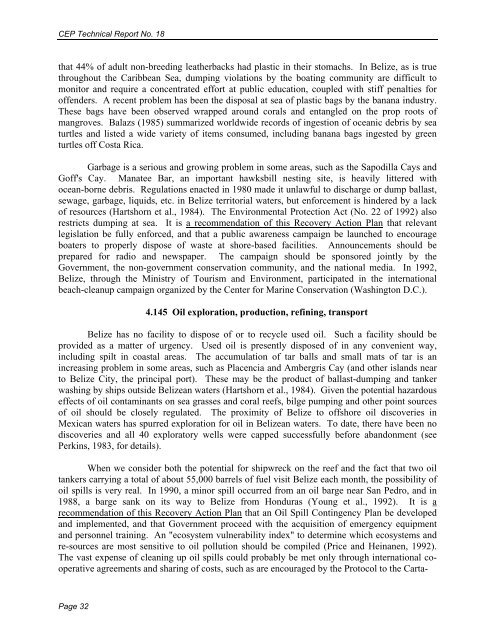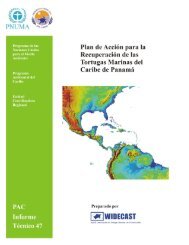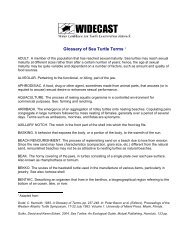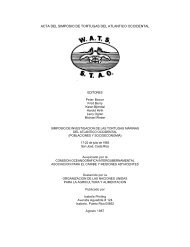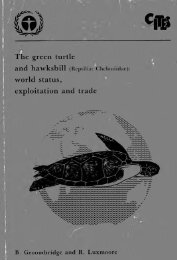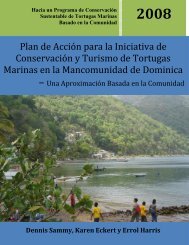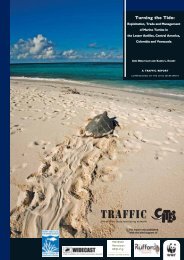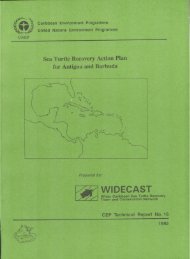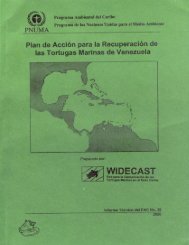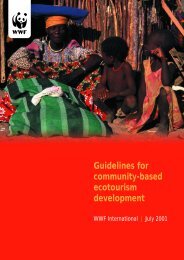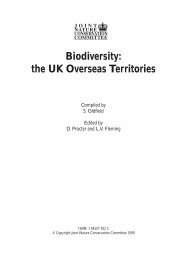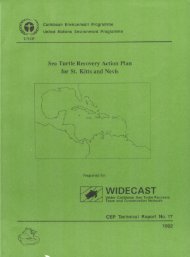Belize - WIDECAST
Belize - WIDECAST
Belize - WIDECAST
Create successful ePaper yourself
Turn your PDF publications into a flip-book with our unique Google optimized e-Paper software.
CEP Technical Report No. 18<br />
that 44% of adult non-breeding leatherbacks had plastic in their stomachs. In <strong>Belize</strong>, as is true<br />
throughout the Caribbean Sea, dumping violations by the boating community are difficult to<br />
monitor and require a concentrated effort at public education, coupled with stiff penalties for<br />
offenders. A recent problem has been the disposal at sea of plastic bags by the banana industry.<br />
These bags have been observed wrapped around corals and entangled on the prop roots of<br />
mangroves. Balazs (1985) summarized worldwide records of ingestion of oceanic debris by sea<br />
turtles and listed a wide variety of items consumed, including banana bags ingested by green<br />
turtles off Costa Rica.<br />
Garbage is a serious and growing problem in some areas, such as the Sapodilla Cays and<br />
Goff's Cay. Manatee Bar, an important hawksbill nesting site, is heavily littered with<br />
ocean-borne debris. Regulations enacted in 1980 made it unlawful to discharge or dump ballast,<br />
sewage, garbage, liquids, etc. in <strong>Belize</strong> territorial waters, but enforcement is hindered by a lack<br />
of resources (Hartshorn et al., 1984). The Environmental Protection Act (No. 22 of 1992) also<br />
restricts dumping at sea. It is a recommendation of this Recovery Action Plan that relevant<br />
legislation be fully enforced, and that a public awareness campaign be launched to encourage<br />
boaters to properly dispose of waste at shore-based facilities. Announcements should be<br />
prepared for radio and newspaper. The campaign should be sponsored jointly by the<br />
Government, the non-government conservation community, and the national media. In 1992,<br />
<strong>Belize</strong>, through the Ministry of Tourism and Environment, participated in the international<br />
beach-cleanup campaign organized by the Center for Marine Conservation (Washington D.C.).<br />
4.145 Oil exploration, production, refining, transport<br />
<strong>Belize</strong> has no facility to dispose of or to recycle used oil. Such a facility should be<br />
provided as a matter of urgency. Used oil is presently disposed of in any convenient way,<br />
including spilt in coastal areas. The accumulation of tar balls and small mats of tar is an<br />
increasing problem in some areas, such as Placencia and Ambergris Cay (and other islands near<br />
to <strong>Belize</strong> City, the principal port). These may be the product of ballast-dumping and tanker<br />
washing by ships outside <strong>Belize</strong>an waters (Hartshorn et al., 1984). Given the potential hazardous<br />
effects of oil contaminants on sea grasses and coral reefs, bilge pumping and other point sources<br />
of oil should be closely regulated. The proximity of <strong>Belize</strong> to offshore oil discoveries in<br />
Mexican waters has spurred exploration for oil in <strong>Belize</strong>an waters. To date, there have been no<br />
discoveries and all 40 exploratory wells were capped successfully before abandonment (see<br />
Perkins, 1983, for details).<br />
When we consider both the potential for shipwreck on the reef and the fact that two oil<br />
tankers carrying a total of about 55,000 barrels of fuel visit <strong>Belize</strong> each month, the possibility of<br />
oil spills is very real. In 1990, a minor spill occurred from an oil barge near San Pedro, and in<br />
1988, a barge sank on its way to <strong>Belize</strong> from Honduras (Young et al., 1992). It is a<br />
recommendation of this Recovery Action Plan that an Oil Spill Contingency Plan be developed<br />
and implemented, and that Government proceed with the acquisition of emergency equipment<br />
and personnel training. An "ecosystem vulnerability index" to determine which ecosystems and<br />
re-sources are most sensitive to oil pollution should be compiled (Price and Heinanen, 1992).<br />
The vast expense of cleaning up oil spills could probably be met only through international cooperative<br />
agreements and sharing of costs, such as are encouraged by the Protocol to the Carta-<br />
Page 32


